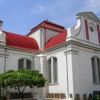වොල්වෙන්ඩල් පල්ලිය
Dutch Reformed Church was introduced to Sri Lanka by the VOC with its first church ministrations held in Galle on 6th October, 1642, almost 360 years ago. Its consistory in Colombo was established in 1658 marking the beginning of protestant church or what they called 'True Christian Reformed Church' subsequently, church councils were formed in Colombo, Galle and Jaffna stationing several Dutch predicants to commence proselytizing activities.
The Wolvendaal Church is the oldest Protestant Church in use in Sri Lanka. It celebrates its 253rd anniversary this year. The name of the church derived from the place name Wolvendaal. Christianity was introduced into The Netherlands between 700 and 750 AD. Later at the time of the renaissance in Europe, the teachings of the French theologian, Jean Calvin (1509-1564) greatly influenced Christianity in The Netherlands. The Dutch as a dynamic nation preferred the freedom and realistic outlook of Calvinism that orthodox Christianity. The teachings of Calvin influenced the Dutch as a trading nation with 'love of gain'. Prof. C.R. Boxer asserts that the Calvinism was the main driving force in the Dutch commercial expansion and cultural flowering which were marked features of the 17th century scene.'
The United Dutch East India Company (VOC) was established in The Netherlands based on the charter issued by the States General in 1602. The birth of the 'True Dutch Reformed Religion' took place as a result of the National Synod held in Dordrecht in 1618/19. This reformed religion was considered the state protected religion in The Netherlands since 1619. At this time the Dutch East India Company was busy with gaining control over the spice trade in the East from the Portuguese. The crew of each of the Dutch voyage to the East accompanied several predicants for the purpose of performing religious rites on board and on land. They were hand-picked by the Board of Directors or the Heren XVII in Amsterdam and paid by the VOC itself.
The religion to the VOC was of secondary importance. Profit was its prime objective. Once a Dutch envoy speaking about religious liberty in The Netherlands in the presence of Charles X of Sweden, the king in reply pulled a rix-dollar from his pocket and said Voila vote religion. The policy of the VOC on religion was always defeated before the 'love of gain'.
The charter of 1602 made no provisions for promotion and maintenance of religious institution in the East. The Company directors were not obliged to spread the light of the Christianity practised in The Netherlands.
When the VOC established its administrative headquarters in the East in Batavia (present Jakarta) the policy adopted was well defined in the following statement of the Board of Directors dispatched to the then Governor General in Batavia, Joan Maetsuiker.
It states 'Nature of government is such that it cannot suffer two equally great controlling powers, any more than a body can endure two heads'. Similarly







